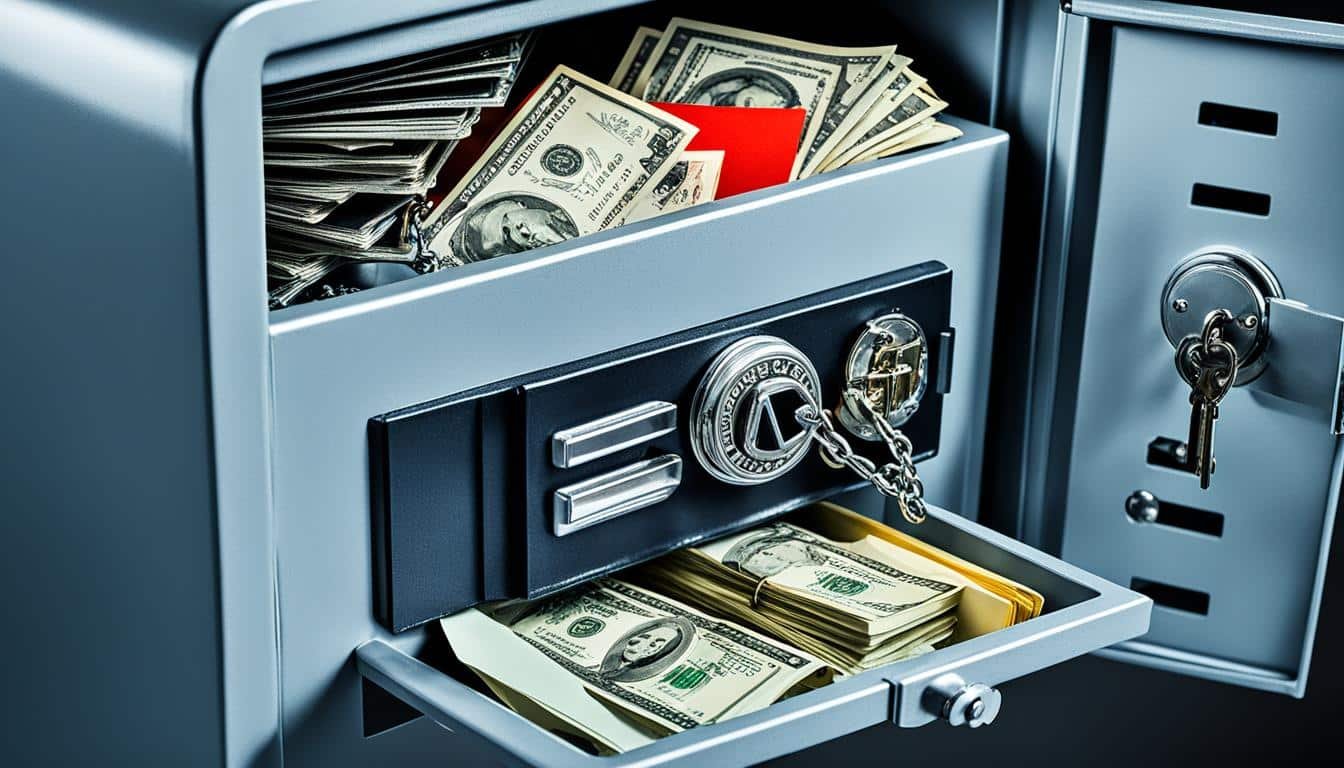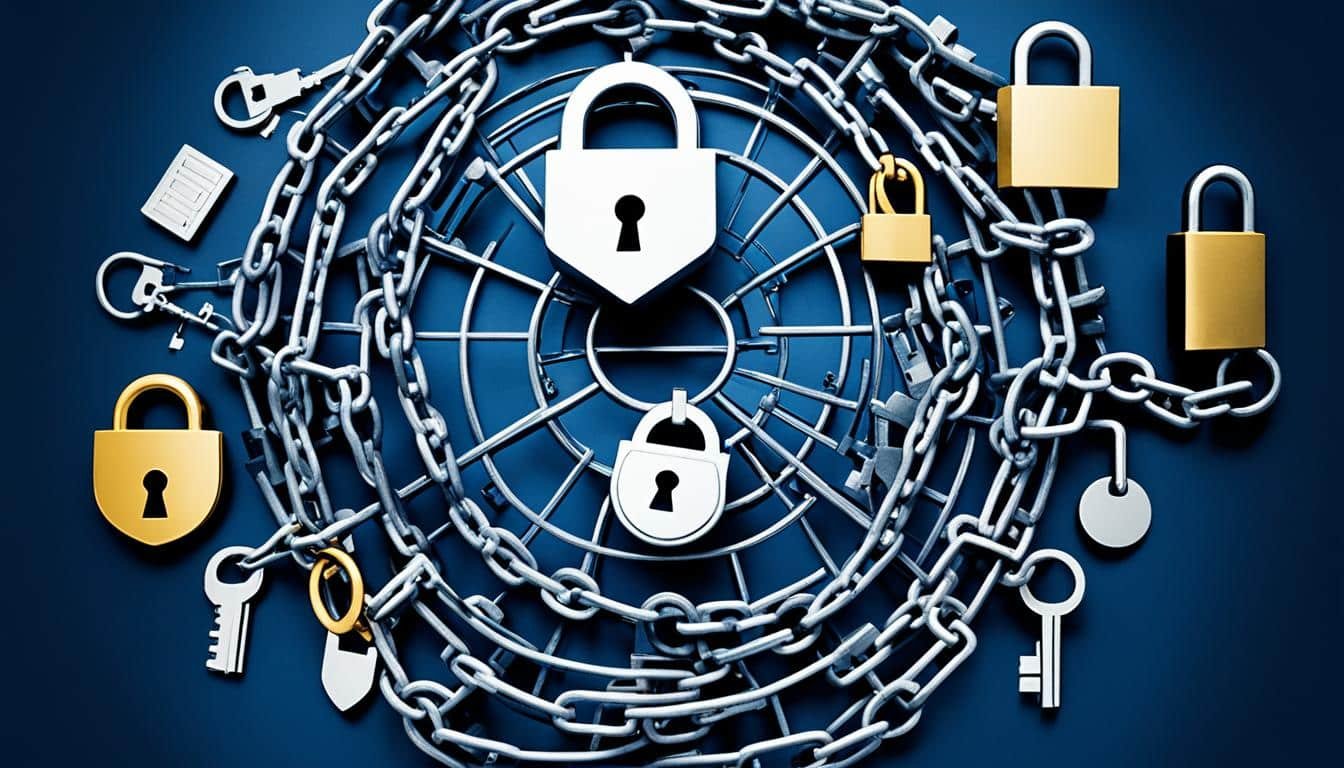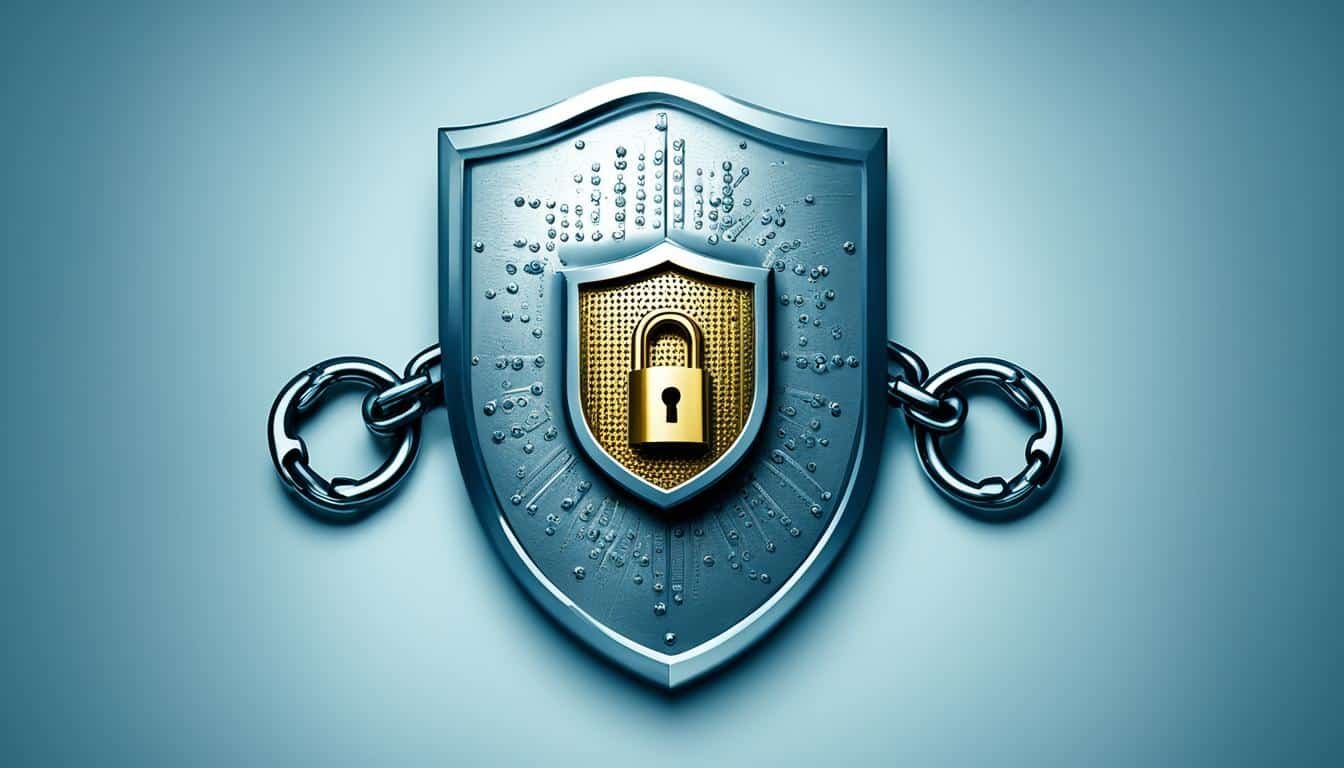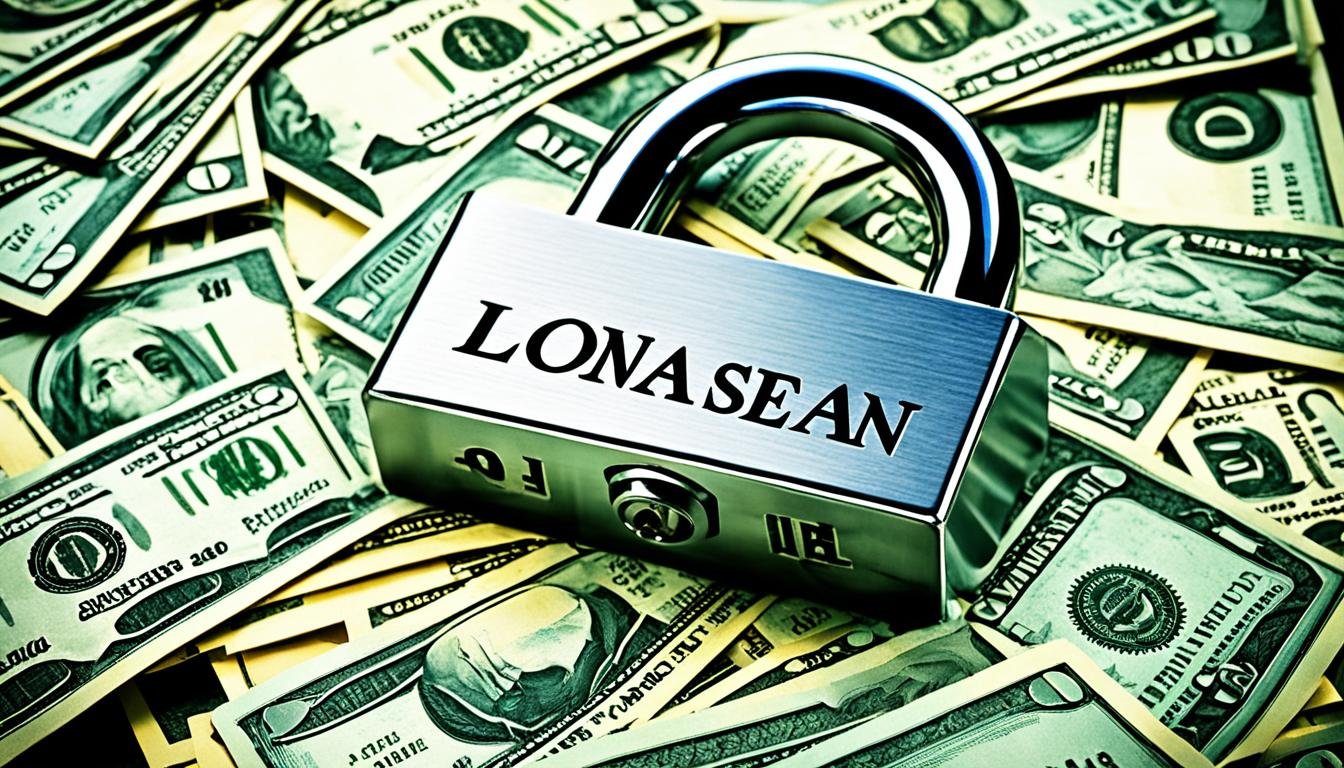When you apply for a loan, you often need to provide loan security. This means you give the lender something valuable, like a house or a car, as a promise. If you can’t pay back the loan, the lender can take this asset and sell it to get their money back.
Loan security is key for several reasons. It makes the lender feel safer, knowing they can get their money back if needed. This lets lenders offer better deals, like lower interest rates and bigger loans. It also helps borrowers get loans even if their credit isn’t great.
Key Takeaways
- Loan security refers to an asset pledged by the borrower to the lender as collateral for a loan.
- Providing loan security reduces the risk for the lender, allowing them to offer better loan terms.
- Offering collateral can improve a borrower’s chances of getting approved for a loan, especially with poor credit.
- Loan security can take many forms, including real estate, vehicles, and personal or business assets.
- Understanding the role of loan security is crucial for both borrowers and lenders in the lending process.
Introduction to Loan Security
Getting a loan is important for both the borrower and the lender. Loans are either secured or unsecured, based on if there’s collateral. A secured loan means you must offer something valuable, like a mortgage, car finance, or jewelry, as security. On the other hand, an unsecured loan doesn’t need any collateral.
Overview of Secured and Unsecured Loans
A secured loan is safer for the lender because you offer something valuable as security. This can lead to lower interest rates for you. But, unsecured loans don’t have this security, so they usually have higher interest rates and stricter eligibility criteria.
The Role of Collateral in Secured Lending
The collateral in a secured loan is a promise to the lender. It means they can get their money back if you can’t pay. Common collateral includes residential property, vehicles, and personal items like jewelry or antiques kept by a pawnbroker. The value and ease of selling the collateral affect the loan terms and if you can get the loan.
“Collateral is the security a borrower provides to a lender, assuring the lender that the loan will be repaid.”
What Qualifies as Loan Security?

When you need a loan, you can use many assets as collateral. For personal loans, common items include your home, car, and jewelry. Business loans often use things like equipment, machinery, and inventory as collateral. They can also use soft assets like intellectual property and licenses.
Common Types of Assets Used as Collateral
An asset must have enough value to cover the loan if you can’t pay it back. Here are some common assets used as collateral:
- Residential property (homes, apartments, etc.)
- Vehicles (cars, trucks, motorcycles, RVs, etc.)
- Equipment and machinery (for business loans)
- Inventory and stock (for business loans)
- Intellectual property (patents, trademarks, copyrights, etc.)
Using these assets can help you get lower interest rates and better loan terms. But remember, the lender can take your collateral if you don’t pay back the loan.
“The right collateral can make a significant difference in the success of your loan application.”
Loan Security for Personal Loans

Borrowers can use their home or apartment as collateral for personal loans. This is often a second mortgage or home equity loan. Valuable items like cars, jewelry, or antiques can also secure personal loans, including car finance or pawnshop loans.
Residential Property as Collateral
Using a borrower’s residential property as loan security has benefits. It can lead to lower interest rates and bigger loan amounts than unsecured loans. But, there’s a risk of losing the property if the loan is not paid back.
Vehicles and Other Personal Assets
Securing a loan with cars, motorcycles, jewelry, or antiques is called a logbook loan or pawnbroker loan. These loans are easier to get but have higher interest rates and fees than a mortgage-backed loan.
| Collateral Type | Typical Loan Type | Interest Rates | Loan Amounts |
|---|---|---|---|
| Residential Property | Mortgage, Home Equity Loan | Lower | Higher |
| Vehicles, Personal Assets | Logbook Loan, Pawnbroker Loan | Higher | Lower |
Securing a personal loan with collateral can offer bigger loan amounts and lower interest rates. But, it’s important to think about the risks and legal issues before using personal assets as loan security.
Loan Security for Business Loans

Businesses can use many assets as security for loans. This includes hard assets like property, equipment, machinery, vehicles, and inventory. Lenders also accept soft assets or intangible assets. These can be things like licenses, trademarks, patents, and copyrights.
Hard Assets and Soft Assets Accepted as Security
Business owners can use both hard assets and soft assets for loan security. Here are some examples:
- Hard Assets: Property, equipment, machinery, vehicles, and stock
- Soft Assets: Intellectual property like licenses, trademarks, patents, and copyrights
Personal Guarantees on Business Loans
Business owners might also need to give a personal guarantee. This makes the business owner personally responsible for the loan if the business can’t pay it back. Offering a personal guarantee shows the lender the owner’s commitment and involvement in the business. It can make getting a business loan easier.
| Hard Assets | Soft Assets |
|---|---|
| Property | Licenses |
| Equipment | Trademarks |
| Machinery | Patents |
| Vehicles | Copyrights |
| Inventory | Intellectual Property |
“Providing collateral is key for getting a business loan. It shows the owner’s commitment and lowers the lender’s risk.”
Loan Security

Loan security is key in finance. It means a borrower gives collateral to a lender to lower the risk of default. Secured loans can have better terms, like lower interest rates, than unsecured ones.
Using loan security is common for personal and business loans. Borrowers might use things like homes, cars, or other valuable items as collateral. For business loans, things like equipment or accounts receivable can secure the loan.
| Loan Type | Collateral Accepted |
|---|---|
| Personal Loans | Residential property, vehicles, other personal assets |
| Business Loans | Hard assets (equipment, real estate) and soft assets (accounts receivable) |
Offering loan security has benefits like lower interest rates and better loan chances. But, there’s a risk of losing the collateral asset if you can’t pay back the loan.
Deciding on loan security depends on your finances, the loan type, and the value of your assets. Thinking about these things can help you make a smart choice and find the right loan security for you.
Advantages of Providing Loan Security

Securing a loan with collateral has many benefits. One big plus is getting lower interest rates than with unsecured loans. This is because lenders see secured loans as less risky, thanks to the collateral.
Also, having collateral can help you borrow more money. Lenders might give you a bigger loan if you offer something valuable as security. This can be a big help if you need a lot of money.
Lastly, collateral can make it easier to get a loan, even if your credit isn’t perfect. Lenders are more likely to say yes when you offer something valuable as security.
“Secured loans can be a game-changer for borrowers, providing access to lower interest rates, higher borrowing limits, and a smoother path to loan approval.”
So, the benefits of securing a loan are clear. It can save you money and give you more financial flexibility. It’s definitely something to think about if you’re looking for financing.
Disadvantages of Providing Loan Security
Secured loans have many benefits, but they also have some downsides. The main risk is losing the asset you used as collateral if you can’t pay back the loan.
Risk of Losing Collateral Asset
When you secure a loan with something valuable like a home or car, you’re risking losing it. If you can’t make your payments, the lender can take back the asset. This could mean losing something you worked hard to get.
Potentially Higher Overall Costs
Secured loans might cost more than unsecured ones. This is because they often have longer repayment times, extra fees for paying off early, and more legal requirements. These costs can make the loan more expensive for you.
Additional Legal Requirements
- Getting a secured loan means more legal requirements and paperwork than an unsecured one.
- You’ll need to show proof of owning the asset, like titles or registrations.
- The lender might ask you to keep insurance on the asset, adding more costs.
Secured loans can have benefits like lower interest rates and more money you can borrow. But, think about the risks of losing collateral, higher costs, and more legal requirements before you decide.
Secured Loans Without Collateral
Secured loans need collateral like a house or car. But, there are other ways to get debt financing without risking your assets. Unsecured personal loans and guarantor loans are great for those who don’t want to offer assets.
Unsecured Personal Loans
Unsecured personal loans are great for people with good credit scores and steady incomes. They don’t require collateral. Instead, they look at your financial history and ability to pay back the loan. These loans might have higher interest rates, but you don’t risk your valuable items.
Guarantor Loans
Guarantor loans are another way to get debt financing without collateral. A friend or family member, the guarantor, signs the loan with you. They promise to pay if you can’t. This makes lenders more likely to offer better loan terms. It’s a good choice for people with not much credit history or no valuable assets.
Unsecured personal loans and guarantor loans might not have the lowest interest rates. But, they’re good for those who don’t want to risk their assets. They’re perfect for getting personal loans or small business loans without collateral.
Choosing the Right Loan Security

When you’re looking to secure a loan, it’s important to think about the collateral you’ll use. You need to look at the asset value and asset liquidity. These factors are key when picking the right loan security.
Evaluating Asset Liquidity and Value
Lenders often prefer liquid assets like real estate or vehicles. These can be sold quickly if you can’t pay back the loan. They usually have a high asset value and are less risky for lenders. On the other hand, assets like jewelry or collectibles are harder to sell and might not be good choices.
Considering Personal and Business Needs
Think about your specific borrowing needs, whether it’s for personal loans or business loans. Using your home as collateral for a business loan could be risky. But, a personal loan secured by a vehicle might be a better choice.
| Loan Security Considerations | Desirable Attributes |
|---|---|
| Asset Liquidity | High liquidity (e.g., real estate, vehicles) |
| Asset Value | High market value, stable appreciation |
| Borrowing Needs | Alignment with personal or business requirements |
By looking at the collateral, asset value, and asset liquidity, and your borrowing needs, you can make a smart choice for loan security.
Lenders Offering Secured Loans
When looking for secured loans, you have many lenders to pick from. Each offers different things and needs. You can choose from traditional banks, credit unions, and new online lenders.
Banks and Credit Unions
Banks and credit unions are great for secured loans. They have many secured loan types, like home equity loans and vehicle loans. These loans come with loan terms and loan rates that can be good deals. But, they might ask for more paperwork and have stricter rules.
Still, they offer personal help and advice during the loan process.
Online Lenders
Online lenders are a newer choice for secured loans. They make applying for loans easy and quick. You might get your loan approved and money faster with them. They have many secured loan options for both personal and business needs.
But, make sure to check the loan terms and loan rates before choosing. This way, you can make sure you’re getting a good deal repay the loan secured credit auto loan type of secured loan.
When looking for a secured loan, it’s important to compare loan offers from different lenders. This helps you find the best loan terms and loan rates for your situation buying a home require you to put less risk editorial loans require take out a secured loan mortgage loan credit cards lien personal property.
Also Read : What Are the Benefits of Loan Modification?
Conclusion
Loan security is key in the lending world. It helps protect both the borrower and the lender. By offering an asset as collateral, borrowers can get better interest rates and bigger loans. But, they must think about the risk of losing that asset.
Borrowers can choose unsecured loans or guarantor loans if they don’t want to give security. It’s important to know the pros and cons of loan security. This knowledge helps in making smart borrowing choices that fit personal or business needs.
Loan security is crucial in the lending scene. It brings benefits and things to think about for borrowers. By looking at different options and understanding the effects, people and businesses can pick the best financing. This helps them reach their goals and stay financially healthy.
FAQs
Q: What is a secured loan?
A: A secured loan is a type of loan that is backed by collateral, such as a home or a car, which the lender can seize if the borrower defaults on the loan.
Q: Why is loan security important?
A: Loan security is important because it reduces the risk for the lender, allowing them to offer lower interest rates to borrowers. It also provides assurance to the lender that they can recoup their funds if the borrower defaults.
Q: How do secured loans work?
A: Secured loans work by requiring the borrower to put up an asset, such as a home or a car, as collateral for the loan. If the borrower defaults, the lender can seize the collateral to recoup their losses.
Q: What are the pros and cons of secured loans?
A: The pros of secured loans include lower interest rates and the ability to borrow larger amounts of money. However, the cons include the risk of losing the collateral if the loan is not repaid.
Q: What happens if I default on a secured loan?
A: If you default on a secured loan, the lender can seize the collateral used to secure the loan, such as your home or car. This can result in foreclosure, repossession, or other consequences depending on the type of loan.
Q: Can I apply for a secured loan with bad credit?
A: Yes, you may be able to get a secured loan even with bad credit, as the collateral reduces the risk for the lender. However, you may face higher interest rates compared to borrowers with good credit.
Q: How is the interest rate on a secured loan determined?
A: The interest rate on a secured loan is typically lower than that of an unsecured loan, as the collateral reduces the lender’s risk. The rate may also be influenced by your credit score and financial history.
Source Links
- https://www.investopedia.com/secured-loans-5076025
- https://www.netlawman.co.uk/ia/security
- https://www.nerdwallet.com/uk/loans/secured-loans/security-for-a-loan/




